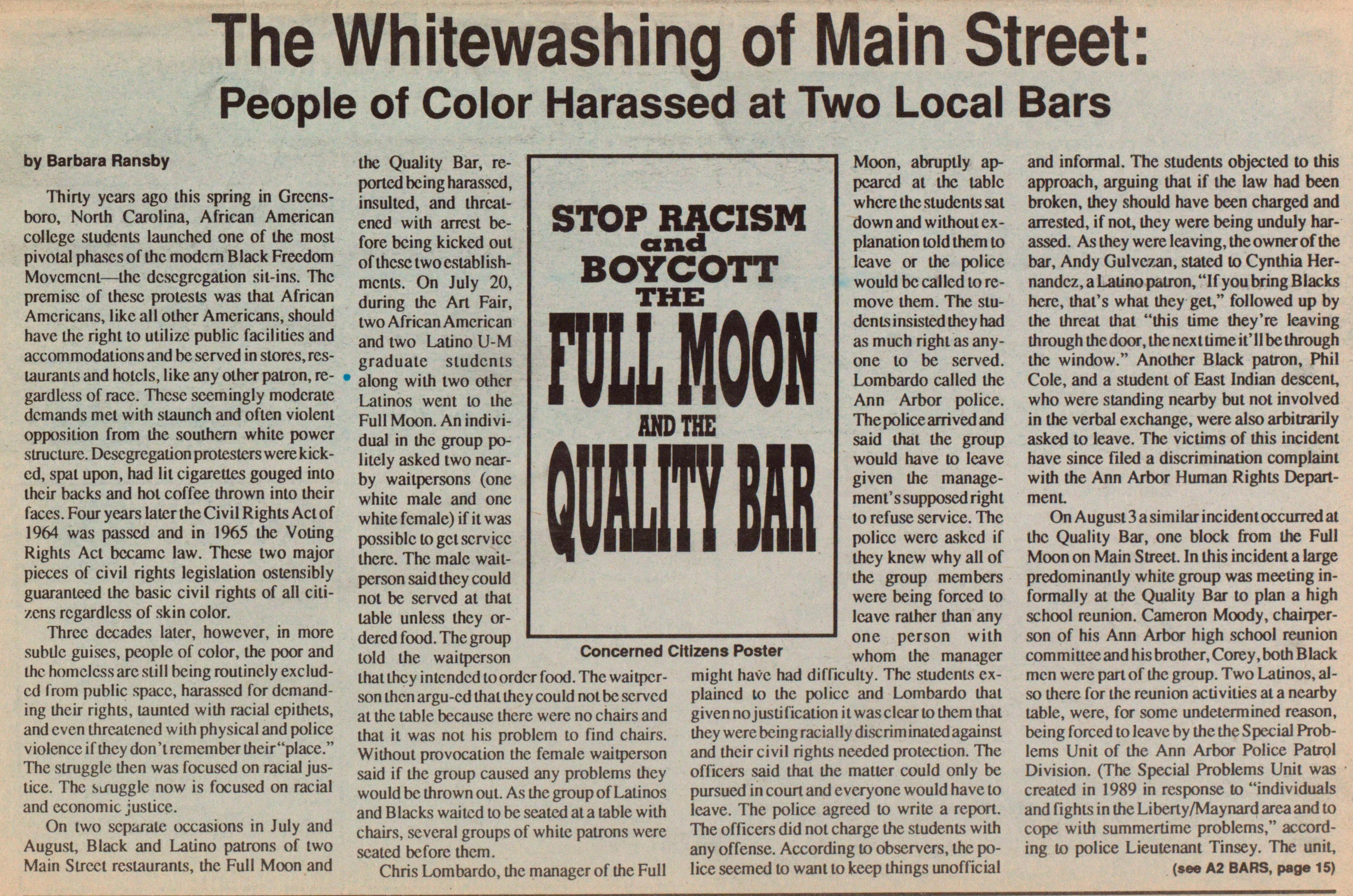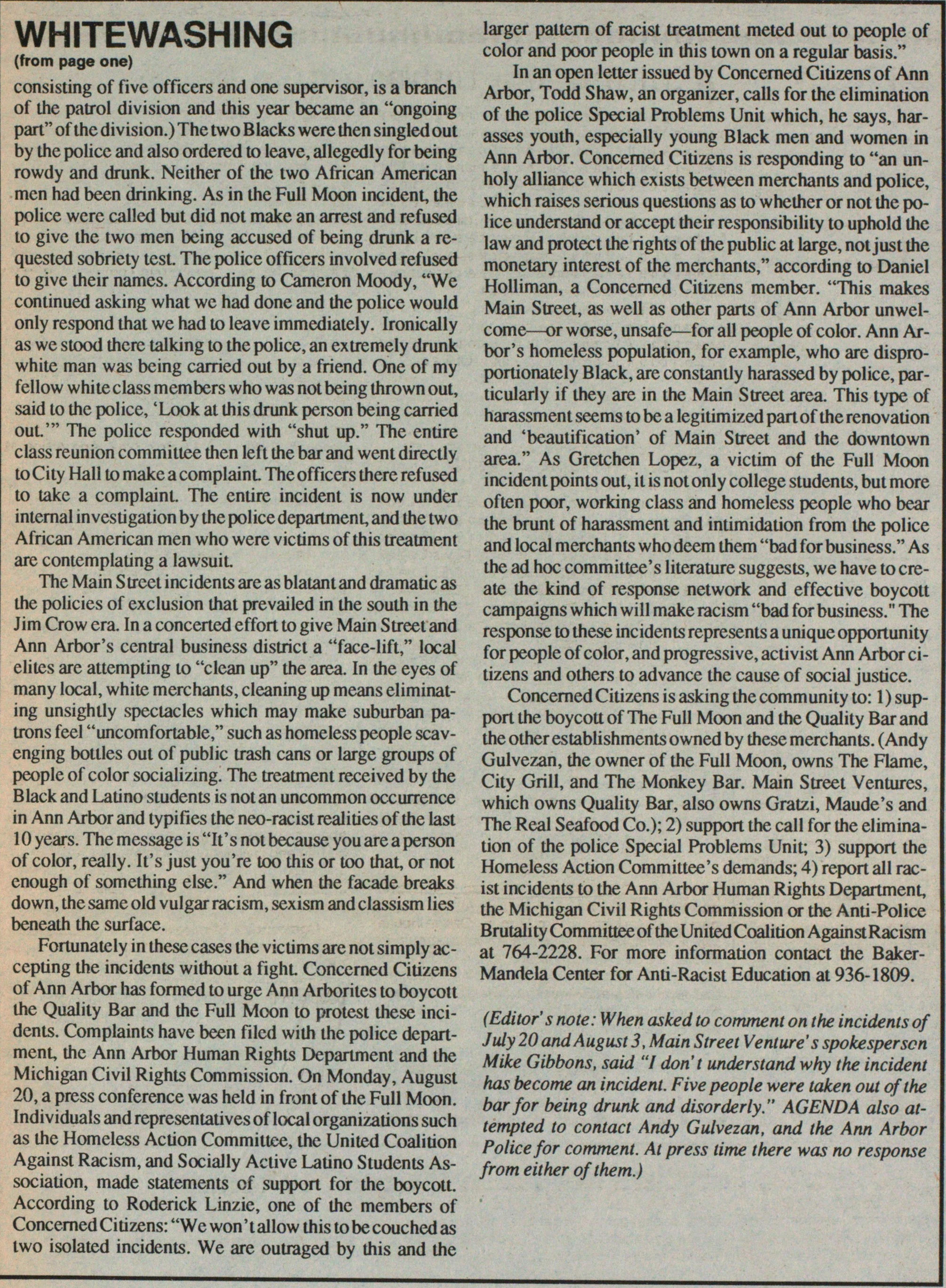The Whitewashing Of Main Street: People Of Color Harassed At Two Local Bars


The Whitewashing of Main Street:
People of Color Harassed at Two Local Bars
by Barbara Ransby
Thirty years ago this spring in Greensboro, North Carolina, African American college students launched one of the most pivotal phases of the modern Black Freedom Movement--the desegregation sit-ins. The premise of these protests was that African Americans, like all other Americans, should have the right to utilize public facilities and accommodations and be served in stores, restaurants and hotels, like any other patron, regardless of race. These seemingly moderate demands met with staunch and often violent opposition from the southern white power structure. Desegregation protesters were kicked, spat upon, had lit cigarettes gouged into their backs and hot coffee thrown into their faces. Four years later the Civil Rights Act of 1964 was passed and in 1965 the Voting Rights Act became law. These two major pieces of civil rights legislation ostensibly guaranteed the basic civil rights of all citizens regardless of skin color.
Three decades later, however, in more subtle guises, people of color, the poor and the homeless are still being routinely excluded from public space, harassed for demanding their rights, taunted with racial epithets, and even threatened with physical and police violence if they don't remember their "place." The struggle then was focused on racial justice. The struggle now is focused on racial and economic justice.
On two separate occasions in July and August, Black and Latino patrons of two Main Street restaurants, the Full Moon and the Quality Bar, reported being harassed, insulted, and threatened with arrest before being kicked out of these two establishments. On July 20, during the Art Fair, two African American and two Latino U-M graduate students along with two other Latinos went to the Full Moon. An individual in the group politely asked two nearby waitpersons (one white male and one white female) if it was possible to get service there. The male waitperson said they could not be served at that table unless they ordered food. The group told the waitperson that they intended to order food. The waitperson then argued that they could not be served at the table because there were no chairs and that it was not his problem to find chairs. Without provocation the female waitperson said if the group caused any problems they would be thrown out. As the group of Latinos and Blacks waited to be seated at a table with chairs, several groups of white patrons were seated before them.
Chris Lombardo, the manager of the Full Moon, abruptly appeared at the table where the students sat down and without explanation told them to leave or the police would be called to remove them. The students insisted they had as much right as anyone to be served. Lombardo called the Ann Arbor police. The police arrived and said that the group would have to leave given the management's supposed right to refuse service. The police were asked if they knew why all of the group members were being forced to leave rather than any one person with whom the manager might have had difficulty. The students explained to the police and Lombardo that given no justification it was clear to them that they were being racially discriminated against and their civil rights needed protection. The officers said that the matter could only be pursued in court and everyone would have to leave. The police agreed lo write a report. The officers did not charge the students with any offense. According to observers, the police seemed to want to keep things unofficial and informal. The students objected to this approach, arguing that if the law had been broken, they should have been charged and arrested, if not, they were being unduly harassed. As they were leaving, the owner of the bar, Andy Gulvezan, stated to Cynthia Hernandez, a Latino patron, "If you bring Blacks here, that's what they get," followed up by the threat that "this time they're leaving through the door, the next time it'll be through the window." Another Black patron, Phil Cole, and a student of East Indian descent, who were standing nearby but not involved in the verbal exchange, were also arbitrarily asked to leave. The victims of this incident have since filed a discrimination complaint with the Ann Arbor Human Rights Department.
On August 3 a similar incident occurred at the Quality Bar, one block from the Full Moon on Main Street. In this incident a large predominantly white group was meeting informally at the Quality Bar to plan a high school reunion. Cameron Moody, chairperson of his Ann Arbor high school reunion committee and his brother, Corey, both Black men were part of the group. Two Latinos, also there for the reunion activities at a nearby table, were, for some undetermined reason, being forced to leave by the the Special Problems Unit of the Ann Arbor Police Patrol Division. (The Special Problems Unit was created in 1989 in response to "individuals and fights in the Liberty/Maynard area and to cope with summertime problems," according to police Lieutenant Tinsey. The unit, consisting of five officers and one supervisor, is a branch of the patrol division and this year became an "ongoing part" of the division.) The two Blacks were then singled out by the police and also ordered to leave, allegedly for being rowdy and drunk. Neither of the two African American men had been drinking. As in the Full Moon incident, the police were called but did not make an arrest and refused to give the two men being accused of being drunk a requested sobriety test. The police officers involved refused to give their names. According to Cameron Moody, "We continued asking what we had done and the police would only respond that we had to leave immediately. Ironically as we stood there talking to the police, an extremely drunk white man was being carried out by a friend. One of my fellow white class members who was not being thrown out, said to the police, 'Look at this drunk person being carried out.'" The police responded with "shut up." The entire class reunion committee then left the bar and went directly to City Hall to make a complaint. The officers there refused to take a complaint. The entire incident is now under internal investigation by the police department, and the two African American men who were victims of this treatment are contemplating a lawsuit.
The Main Street incidents are as blatant and dramatic as the policies of exclusion that prevailed in the south in the Jim Crow era. In a concerted effort to give Main Street and Ann Arbor's central business district a "face-lift," local elites are attempting to "clean up" the area. In the eyes of many local, white merchants, cleaning up means eliminating unsightly spectacles which may make suburban patrons feel "uncomfortable," such as homeless people scavenging bottles out of public trash cans or large groups of people of color socializing. The treatment received by the Black and Latino students is not an uncommon occurrence in Ann Arbor and typifies the neo-racist realities of the last 10 years. The message is "It's not because you are a person of color, really. It's just you're too this or too that, or not enough of something else." And when the facade breaks down, the same old vulgar racism, sexism and classism lies beneath the surface.
Fortunately in these cases the victims are not simply accepting the incidents without a fight. Concerned Citizens of Ann Arbor has formed to urge Ann Arborites to boycott the Quality Bar and the Full Moon to protest these incidents. Complaints have been filed with the police department, the Ann Arbor Human Rights Department and the Michigan Civil Rights Commission. On Monday, August 20, a press conference was held in front of the Full Moon. Individuals and representatives of local organizations such as the Homeless Action Committee, the United Coalition Against Racism, and Socially Active Latino Students Association, made statements of support for the boycott. According to Roderick Linzie, one of the members of Concerned Citizens: "We won't allow this to be couched as two isolated incidents. We are outraged by this and the larger pattern of racist treatment meted out to people of color and poor people in this town on a regular basis."
In an open letter issued by Concerned Citizens of Ann Arbor, Todd Shaw, an organizer, calls for the elimination of the police Special Problems Unit which, he says, harasses youth, especially young Black men and women in Ann Arbor. Concerned Citizens is responding to "an unholy alliance" which exists between merchants and police, which raises serious questions as to whether or not the police understand or accept their responsibility to uphold the law and protect the rights of the public at large, not just the monetary interest of the merchants," according to Daniel Holliman, a Concerned Citizens member. "This makes Main Street, as well as other parts of Ann Arbor unwelcome--or worse, unsafe--for all people of color. Ann Arbor's homeless population, for example, who are disproportionately Black, are constantly harassed by police, particularly if they are in the Main Street area. This type of harassment seems to be a legitimized part of the renovation and 'beautification' of Main Street and the downtown area." As Gretchen Lopez, a victim of the Full Moon incident points out, it is not only college students, but more often poor, working class and homeless people who bear the brunt of harassment and intimidation from the police and local merchants who deem them "bad for business." As the ad hoc committee's literature suggests, we have to create the kind of response network and effective boycott campaigns which will make racism "bad for business." The response to these incidents represents a unique opportunity for people of color, and progressive, activist Ann Arbor citizens and others to advance the cause of social justice.
Concerned Citizens is asking the community to: 1) support the boycott of The Full Moon and the Quality Bar and the other establishments owned by these merchants. (Andy Gulvezan, the owner of the Full Moon, owns The Flame, City Grill, and The Monkey Bar. Main Street Ventures, which owns Quality Bar, also owns Gratzi, Maude's and The Real Seafood Co.); 2) support the cali for the elimination of the police Special Problems Unit; 3) support the Homeless Action Committee's demands; 4) report all racist incidents to the Ann Arbor Human Rights Department, the Michigan Civil Rights Commission or the Anti-Police Brutality Committee of the United Coalition Against Racism at 764-2228. For more information contact the Baker-Mandela Center for Anti-Racist Education at 936-1809.
(Editor' s note: When asked to comment on the incidents of July 20 and August 3, Main Street Venture's spokesperson Mike Gibbons, said "I don't understand why the incident has become an incident. Five people were taken out of the bar for being drunk and disorderly." AGENDA also attempted to contact Andy Gulvezan, and the Ann Arbor Police for comment. At press time there was no response from either of them.)
STOP RACISM AND BOYCOTT THE FULL MOON AND THE QUALITY BAR
Concerned Citizens Poster
Article
Subjects
Barbara Ransby
Full Moon Restaurant
Quality Bar
Ann Arbor Street Art Fair
Ann Arbor Human Rights Department
Ann Arbor Police Department
Concerned Citizens of Ann Arbor
Michigan Civil Rights Commission
Homeless Action Committee (HAC)
United Coalition Against Racism (UCAR)
Socially Active Latino Students Association (SALSA)
Main Street Ventures
The Flame (Restaurant)
City Grill
The Monkey Bar
Gratzi (Restaurant)
Maude's (Restaurant)
Real Seafood Company
Old News
Agenda
Chris Lombardo
Andy Gulvezan
Cynthia Hernandez
Phil Cole
Cameron Moody
Corey Moody
Roderick Linzie
Todd Shaw
Daniel Holliman
Gretchen Lopez
Mike Gibbons
Greensboro North Carolina
Ann Arbor City Hall